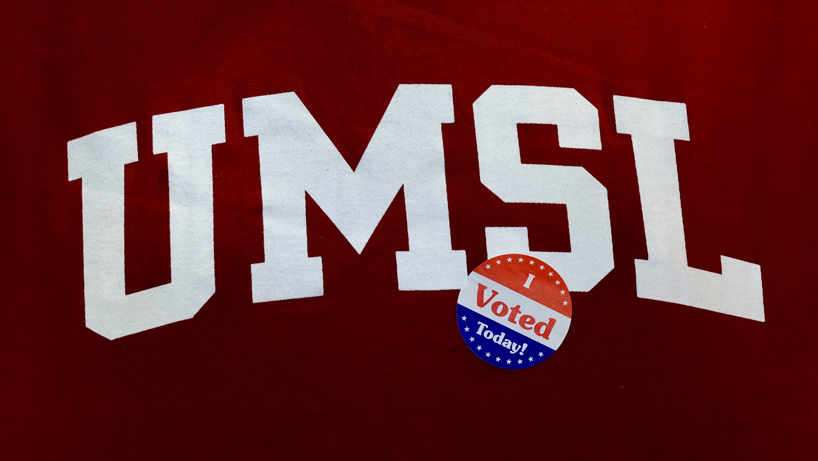
A study conducted by Tufts University showed that 67.4 percent of eligible UMSL students voted last November, a rate 17 percent higher than students nationally when controlled for factors such as the age of the student body. (Photo by August Jennewein)
Civic engagement, already high on the campus of the University of Missouri–St. Louis, increased even more in the 2016 election cycle.
An impressive 67.4 percent of eligible UMSL students voted last November, according to data gathered as part of the National Study of Learning, Voting and Engagement conducted by researchers at Tufts University.
That was an increase of 5.7 percentage points over the school’s 2012 numbers, which were already considered an outlier among the more than 1,000 institutions to take part in the study.
UMSL students voted at a 17 percent higher rate than students nationally when controlled for factors such as the age of the school’s student population.
“This warms my heart,” said Anita Manion, an associate teaching professor of political science who represents the department on UMSL’s Civic Engagement Coalition. “I know that our students – they’re largely working-class students, and they have obligations other than school. It’s a commuter campus, so it’s not like they can just go right here and vote. They have to go to school, go home, figure out where they’re voting, do all those things.
“To still maintain this level of civic engagement with all the things they have on their plates, that makes me excited and proud and hopeful.”
It’s hard to pinpoint exactly why UMSL students are so civic-minded, but a conscious effort has been made since the initial NSLVE study in 2012 to cultivate their engagement.
That included the formation of the Civic Engagement Coalition, which brings together representatives from the Office of Academic Affairs, the Office of Admissions, the Gender Studies program, the Office of Residential Life and Housing, the Division of Student Affairs, the Office of Student Involvement, the Sue Shear Institute for Women in Public Life, the Sustainability/Environmental Health and Safety office, students from the Associated Students of the University of Missouri, the Student Government Association and the University Program Board, along with faculty members from the departments of communication and media, English and political science.
It’s allowed better coordination when it comes to holding civic-related events and working to register voters. The latest example will be seen Tuesday on National Voter Registration Day.
“All of us that are engaged in that kind of work sat together and said, ‘What can we do to support each other’s work?’” said Patricia Zahn, the director of the Des Lee Collaborative Vision. “’Instead of you just doing this and you doing that, which you did before, how can we support and get more information out to the students?’”
A lot has happened organically.
“Part of UMSL that makes it wonderful and unique is that people are doing this work, and they’re talking about it already, and they didn’t necessarily need a structure like a civic engagement committee or team to do that,” Zahn said. “We’ve got professors who are talking about voting in their classes. They’re talking about politics. We’ve got students coming on our campus that are engaged in their community.”
Members of the coalition are still aiming for more, particularly when it comes to engagement in midterm or state and local elections, where turnout typically lags.
“There’s so much potential there,” said Jordan Lucas, president of ASUM’s UMSL chapter, after seeing the discrepancy between voting numbers in the 2014 election compared to 2016.
It’s one of the reasons he’s excited to be working to register voters this week.
“If we can get ahead of it as much as possible and add a handful of voters a month, then that’s something,” Lucas said.
Zahn believes fostering civic engagement is fundamental to UMSL’s mission.
“We have a responsibility to our community and that’s part of who we are as a university,” she said. “That’s why we educate people – for citizenship. That’s why we have public education.
“For the work that we’re doing, we are really trying to make a point to make sure that our students are comfortable and confident to go vote and take part in the civic process.”















